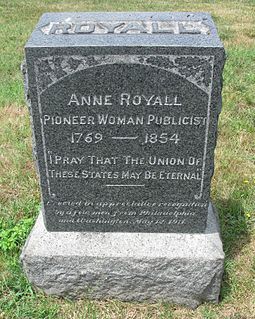A Quote by James Madison
Is the appointment of Chaplains to the two Houses of Congress consistent with the Constitution, and with the pure principle of religious freedom? In strictness the answer on both points must be in the negative. The Constitution of the U. S. forbids everything like an establishment of a national religion. The law appointing Chaplains establishes a religious worship for the national representatives, to be performed by Ministers of religion, elected by a majority of them, and these are to be paid out of the national taxes. Does this not involve the principle of a national establishment ... ?
Quote Topics
Related Quotes
The proposed constitution, therefore, even when tested by the rules laid down by its antagonists, is, in strictness, neither a national nor a federal constitution; but a composition of both. In its foundation it is federal, not national; in the sources from which the ordinary powers of the government are drawn, it is partly federal, and partly national; in the operation of these powers, it is national, not federal; in the extent of them again, it is federal, not national; and finally, in the authoritative mode of introducing amendments, it is neither wholly federal, nor wholly national.
[T]he bill exceeds the rightful authority to which governments are limited by the essential distinction between civil and religious functions, and violates in particular the article of the Constitution of the United States which declares that Congress shall make no law respecting a religious establishment.... This particular church, therefore, would so far be a religious establishment by law, a legal force and sanction being given to certain articles in its constitution and administration.
I believe in the Constitution. I believe in separation of powers. I believe in the rule of law. I believe in limited government. And these are principles and policies that apparently neither the national Republican nor the national Democrat Party believes in. I believe great damage is being done to our Constitution, and I see no remedy at all, no likelihood of that changing, if we rely on the two parties to field our candidates for national office.
What does Christianity mean today? National Socialism is a religion. All we lack is a religious genius capable of uprooting outmoded religious practices and putting new ones in their place. We lack traditions and ritual. One day soon National Socialism will be the religion of all Germans. My Party is my church, and I believe I serve the Lord best if I do his will, and liberate my oppressed people from the fetters of slavery. That is my gospel.
Because the bill in reserving a certain parcel of land in the United States for the use of said Baptist Church comprises a principle and a precedent for the appropriation of funds of the United States for the use and support of religious societies, contrary to the article of the Constitution which declares that "Congress shall make no law respecting a religious establishment."
Let it simply be asked where is the security for property, for reputation, for life, if the sense of religious obligation deserts the oaths, which are the instruments of investigation in the Courts of Justice? And let us with caution indulge the opposition, that morality can be maintained without religion. Whatever may be conceded to the influence of refined education on minds of peculiar structure, reason and experience both forbid us to expect that National morality can prevail in exclusion of religious principle.
In recent years a new International System has been developing, oriented toward the establishment of norms and principles of universal jurisdiction, above national sovereignty, in the areas of what is called the New Agenda...we have to confront ..... what I dare to call the Anglo-Saxon prejudice against the establishment of supra-national organizations.
I believe that the Constitution is not hostile to the idea that national problems can be solved at the national level through the cooperative efforts of the three coequal branches of government, the Congress, the executive and courts. But not every president, not every legislator and not every judge agrees that the federal government has the power to address and to try to remedy the twin national problems of poverty and access to equal opportunity.
The one eternal religion is applied to the opinions of various minds and various races. There never was my religion or yours, my national religion or your national religion; there never existed many religions, there is only the one. One infinite religion existed all through eternity and will ever exist, and this religion is expressing itself in various countries in various ways.
























